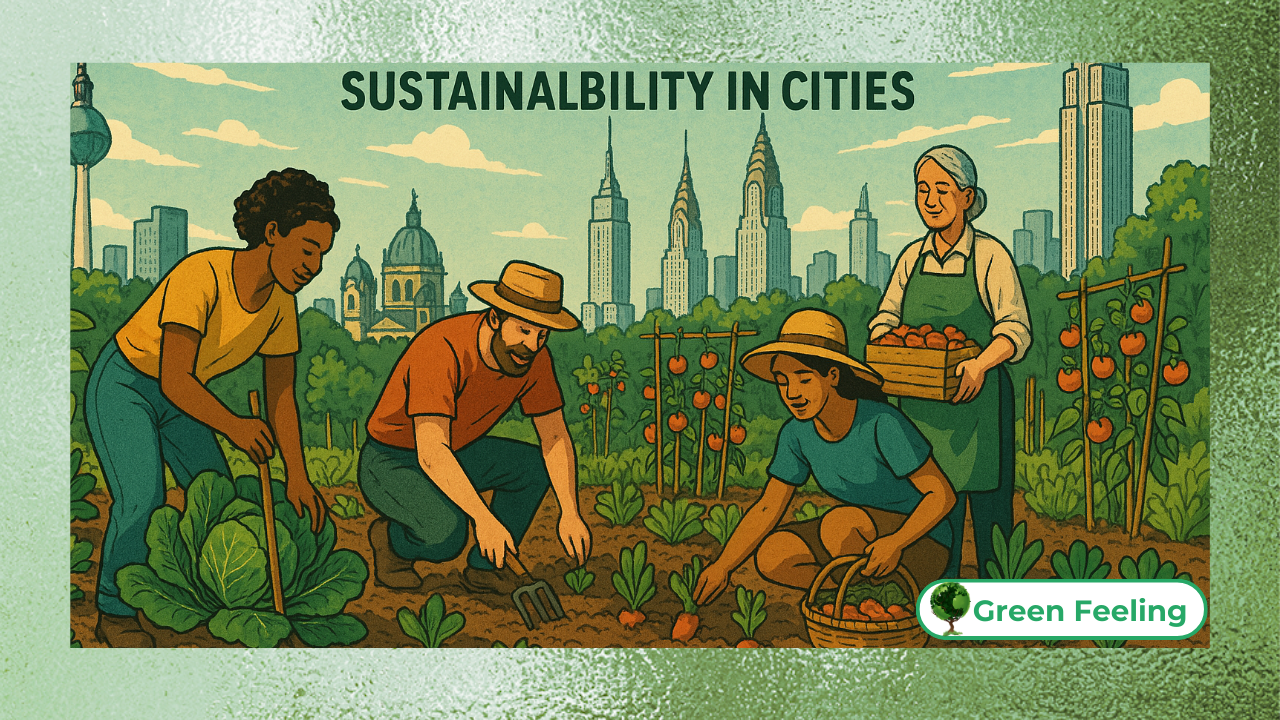Gastronomy and Sustainability in Cinema: Recipes Inspired by Films
This article explores the intersection of cinema, gastronomy, and sustainability by analyzing films that highlight eco-friendly food practices and culinary storytelling.

Through the lens of cinematic narratives, we examine how food choices impact environmental sustainability and cultural traditions.
The discussion includes case studies of influential films, recipes inspired by them, and an analysis of their impact on sustainable food consumption.
Food plays a crucial role in cinema, often symbolizing cultural heritage, emotional connections, and societal values.
In recent years, films have increasingly focused on sustainable gastronomy, showcasing the importance of organic produce, ethical consumption, and farm-to-table movements.
Movies such as Chef (2014), Ratatouille (2007), and Julie & Julia (2009) not only celebrate cooking but also emphasize responsible food sourcing and mindful eating.
- Cinema influences food trends and consumer choices.
- Films raise awareness about sustainability in the culinary world.
The representation of sustainable gastronomy in cinema inspires viewers to adopt healthier and more environmentally friendly diets.
The integration of organic ingredients, reduced food waste, and plant-based cooking are common themes that align with global sustainability goals.
- Cooking scenes in films often reflect cultural and ecological narratives.
- Sustainable gastronomy contributes to environmental conservation.
This article explores how films influence sustainable food consumption and presents recipes inspired by iconic cinematic dishes that align with ecological principles.
+ From Field to Screen: Films Celebrating Sustainable Agriculture
The Evolution of Food Representation in Cinema
The portrayal of food in cinema has evolved significantly over the decades.
In early Hollywood films, food often played a background role, serving as a setting for conversations rather than a focal point.
However, as global food culture became more prominent, films started incorporating detailed depictions of cooking, ingredients, and the significance of meals.
- Classic films such as Babette’s Feast (1987) used food to symbolize generosity and cultural exchange.
- Modern films like Burnt (2015) explore the passion and challenges behind professional gastronomy.
This shift in representation reflects society’s growing interest in food sustainability, ethical consumption, and the artistry of cooking.
The Role of Cinema in Promoting Sustainable Gastronomy

Films have the power to educate and inspire audiences.
According to Smith (2020), cinematic storytelling shapes food perceptions and dietary habits.
Documentaries and fictional films alike highlight the benefits of organic farming, fair trade, and ethical animal husbandry.
Movies such as Food, Inc. (2008) expose the realities of industrial food production.
Culinary films encourage viewers to appreciate local and seasonal ingredients.
Table 1 illustrates key films that promote sustainable gastronomy and their impact on audience awareness:
| Film Title | Themes |
Impact on Sustainability
|
| Food, Inc. (2008) | Industrial agriculture |
Increased demand for organic products
|
| Ratatouille (2007) | Fresh ingredients, creativity |
Encouraged home cooking and appreciation of quality food
|
| Chef (2014) | Local food sourcing |
Popularized food trucks and fresh produce
|
| Julie & Julia (2009) | Traditional recipes, farm-to-table |
Revived interest in home cooking and organic products
|
| The Biggest Little Farm (2018) | Regenerative farming |
Promoted sustainable agriculture awareness
|
Sustainable Food Documentaries and Their Impact
Documentaries have played a crucial role in educating the public about sustainability.
Films such as Cowspiracy (2014) and The Game Changers (2018) explore the environmental and health benefits of plant-based diets.
- Documentaries provide in-depth research and real-world insights into sustainable food practices.
- They often lead to widespread movements advocating for policy changes and consumer awareness.
Recipes Inspired by Sustainable Films

1. Ratatouille – A Celebration of Local Ingredients
Inspired by Pixar’s Ratatouille (2007), this dish exemplifies the use of seasonal vegetables, reducing carbon footprints by avoiding imported goods.
Ingredients:
- 1 eggplant
- 1 zucchini
- 1 yellow squash
- 2 tomatoes
- 1 red bell pepper
- 2 tbsp olive oil
- Fresh basil, thyme, and garlic
Sustainable Cooking Tips:
- Buy vegetables from local farmers’ markets.
- Use organic ingredients to minimize pesticide exposure.
- Reduce food waste by composting vegetable scraps.
2. Julia Child’s Boeuf Bourguignon – Ethical Meat Consumption
As featured in Julie & Julia (2009), Boeuf Bourguignon highlights the importance of ethical meat consumption and slow cooking.
Ingredients:
- 1 kg grass-fed beef
- 2 carrots
- 1 onion
- 2 cloves garlic
- 500 ml red wine
- 200 g mushrooms
Sustainability Tips:
- Opt for grass-fed, free-range beef.
- Use locally sourced vegetables.
- Avoid plastic packaging when purchasing ingredients.
3. Cuban Sandwich – Supporting Local Food Businesses
Inspired by Chef (2014), the Cuban sandwich symbolizes the power of fresh ingredients and locally sourced meats.
Ingredients:
- 2 slices of sourdough bread
- 100 g roasted pork
- 2 slices of Swiss cheese
- Pickles and mustard
Sustainability Tips:
- Support local butchers and bakeries.
- Choose preservative-free bread and meats.
- Reduce food waste by repurposing leftover pork.
+ Southern Collard Greens Recipe
How to Improve Gastronomy and Sustainability
Sustainable gastronomy can be improved through conscious efforts at individual and institutional levels.
Encouraging responsible food consumption and waste reduction is essential for a healthier planet.
Promote plant-based diets to reduce carbon emissions. Support local farmers and organic food markets.
Governments and food organizations should implement policies that encourage ethical sourcing, sustainable agriculture, and reduced food waste. Schools and culinary institutions can integrate sustainability courses into their curriculums.
Educate chefs and restaurateurs on eco-friendly practices.
Develop innovative food waste reduction programs.
Consumers can make a difference by choosing ethical brands, reducing meat consumption, and embracing seasonal and locally grown foods.
By incorporating these principles, both individuals and industries can create a more sustainable food system.
+ Sustainable Management Practices: Ancestral Teachings for Modern Agriculture
How Streaming Platforms Promote Sustainable Food Culture
With the rise of streaming services, food documentaries and culinary series have reached a wider audience than ever before.
Platforms such as Netflix, Hulu, and Amazon Prime offer numerous programs focused on sustainability.
Series like Chef’s Table showcase the work of chefs committed to ethical food practices.
Documentaries on major platforms provide accessibility to critical discussions on food sustainability.
The Impact of Sustainable Gastronomy Films
Movies inspire viewers to reconsider their eating habits and support sustainable food systems. A study by Taylor (2021) shows that audiences exposed to culinary documentaries are more likely to adopt eco-friendly diets.
| Film Title |
Influence on Consumer Behavior
|
| Food, Inc. |
Increased demand for organic and non-GMO foods
|
| Ratatouille |
Encouraged home cooking and reduction of processed foods
|
| Chef |
Popularized food trucks and local cuisine
|
| The Biggest Little Farm |
Boosted awareness of regenerative agriculture
|
| Julie & Julia |
Inspired traditional home cooking practices
|
+ The Best French Toast Recipe
Conclusion
Cinema is a powerful tool for promoting sustainable gastronomy.
Films that highlight ethical food choices, organic ingredients, and responsible farming contribute to environmental consciousness.
Future research should explore the long-term impact of such films on food policies and consumer behavior.
Greater representation of plant-based diets in films could further influence sustainable eating.
Funding independent food documentaries would expand public knowledge on eco-friendly gastronomy.






